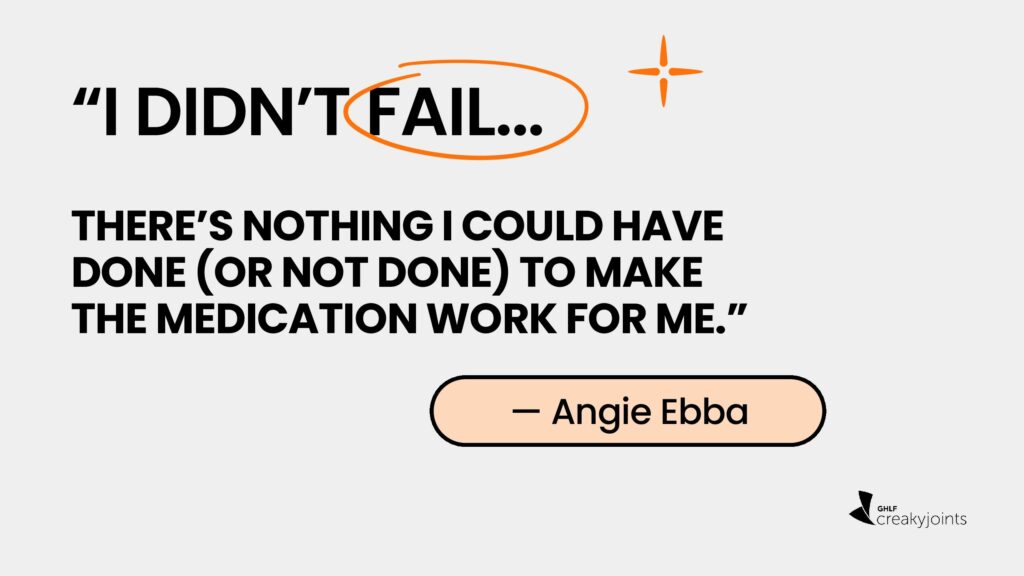“You’ve failed on this medication,” my rheumatologist said, “We’ll have to look at other biologics you can try.” Immediately upon hearing her say this, I cringed.
Unfortunately, this was not my first time hearing this. In fact, in the course of the seven years since my diagnosis, I’ve “failed” five different biologic medications. Hearing I’d have to change medications again, with all the possible implications that accompany that, was distressing. But equally upsetting to me was the language used — the idea that I had somehow failed.Growing up, I was the child who got excited for extra credit assignments and constantly strived for the best grades possible. My parents held me to high academic standards, but I held myself to even higher ones. Failure was never an option for me, and I would be devastated even if I got a C instead of an A or B grade in school.
To hear, then, that I’d failed, brought up all sorts of feelings of inadequacy. What had I done wrong? What could I have done to prevent this?
But the reality is, I didn’t fail in any way. There’s nothing I could have done (or not done) to make the medication work for me. There’s nothing wrong with me; what’s wrong is the language we use. Unfortunately, instances like this are far too common in the world of chronic illness.
Medicine and Metaphors
Imagery-rich and metaphorical language abounds in the medical field. We are chronic illness warriors, or going to battle with our disease. We fight our symptoms, and there are wars on conditions.
As a whole, metaphors can be helpful for understanding complex medical concepts and ideas. Metaphors like the “spoon theory,” where we compare the energy we have on a given day to spoons or other units of measure, can help explain things that are otherwise really unexplainable. In fact, some research shows that doctors who use metaphors to explain things to their patients are seen as better communicators.
But some of the language and metaphor choices can be harmful, too.
- What does it mean to be battling a chronic illness, which by its very nature is an illness that is likely never going to be cured and we can’t ‘win’ against?
- How does it impact our self views if we say our bodies are fighting us?
- How do we feel if we’re told we’re failing a medication or that someone lost their war with an illness?
The language of chronic illness often sets up a relationship of a winner and loser, successes and failures. It makes me feel if I’m struggling with my symptoms or if I ‘fail’ my medication, I’m not fighting hard enough or being a strong enough warrior.”
The reality is much different though. Sometimes symptoms are going to be overwhelming. Sometimes medications aren’t going to work. Sometimes an illness — because it is chronic — is going to progress and get worse. None of those things make us, as patients, failures.
Shifting the Language of Chronic Illness
I did not fail my biologics. In truth, they just didn’t work out for whatever reason, which is a natural part of treating a chronic condition.
The existing language often used in the medical field pits me against myself, so I’m battling my body instead of trying to work with it. What if, instead, we could shift the language?
I used to sigh and say my body hated me, or that my body was trying to kill me. I realized, however, that puts me in a position where the very vessel I live in is an enemy. I don’t want to live my life at war with myself, and so I began shifting my language.
Now when my symptoms flare up I ask myself what my body is trying to communicate with me. What is my body telling me through this bloated belly or these stiff joints? Does my body need more rest, different foods, a hot bath? Does it need a new medication or a different treatment?
I tried to reframe my experience with biologics. I did not fail off of the medication; it simply wasn’t the right fit for my body. If I had a pair of pants that didn’t fit, I wouldn’t say I failed those pants. I’d just look for a pair that worked for me. In the same way, I didn’t fail because my medication no longer worked. I just need to look for a medicine that works better for my body. With the medication not working, my body is trying to communicate to me a different need.
As I’ve begun shifting my language away from fighting, battling, and being a warrior, I’ve found it much easier to accept the changes in my body, and work with my body to find solutions to the symptoms I’m facing. I feel less upset about my condition, and I can approach it more from a place of gentle compassion.
My body is not failing; it is succeeding at communicating with me.
I am not failing; I am beginning to listen to myself and my needs. I am changing the way I view my body and my illness.
I am not failing. I am learning.
Be a More Proactive Patient with PatientSpot
PatientSpot (formerly ArthritisPower) is a patient-led, patient-centered research registry for people living with chronic conditions. You can participate in voluntary research studies about your health conditions and use the app to track your symptoms, disease activity, and medications — and share with your doctor. Learn more and sign up here.
Have, H, et al. “Metaphors in Medicine.” Medicine, Health Care and Philosophy. December 2022. doi: https://doi.org/10.1007/s11019-022-10117-9.






